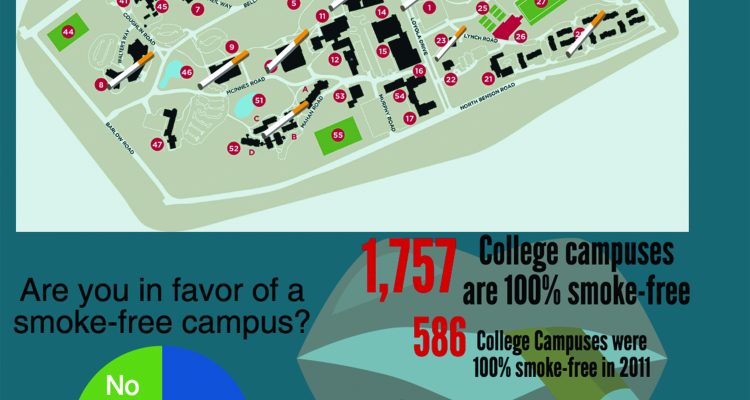The days of seeing people having a quick smoke outside their classrooms, dorm buildings and the Barone Campus Center will soon be gone as Fairfield University is transitioning to a tobacco-free campus by January of 2018.
The campus will transition to having designated smoking areas starting on March 20, 2017
The origins of the initiative date back to 2015 when Danielle Pittala ‘16, a then-rising senior nursing student, brought the idea to the Fairfield University Student Association. FUSA conducted surveys of the student body to see what kind of reception such an initiative would receive. The results were overwhelmingly positive, with 70.93 percent of respondents agreeing with changing Fairfield’s smoking policy, 47 percent saying that Fairfield should go smoke-free as soon as this semester (spring 2017) and 93.6 percent saying they would not have changed their minds about attending Fairfield if they knew that it was going to be a tobacco free campus.
Freshman Cindy Louis agrees that going smoke-free is a good idea.
“Tobacco is such a bad thing and a lot of people don’t know how much harm it does, so I think getting rid of it is a good thing and a step in the right direction,” Louis said.
However, some students do not agree with the initiative.
“I have mixed feelings about it,” said Brian Daley ‘19. “I don’t personally smoke, so it doesn’t affect me as much, but I think if someone does and they want to in certain locations, I think they should be able to.”
Around the same time, Fairfield was encouraged to join a nationwide initiative to make all colleges with schools of nursing tobacco-free campuses. This initiative was created by the American Association of Colleges of Nursing, according to Meredith Wallace Kazer, dean of the Marion Peckham Egan School of Nursing and Health Studies.
Kazer explained that the initiative did not start for another two years after the AACN invited them to join because of a desire to assist the students who will find the transition difficult.
“We wanted to be very respectful of people’s smoking habits and how to ensure that we have a healthy campus environment but also are respectful of the people who continue to smoke,” commented Kazer.
Dean of Students Karen Donoghue ‘03, however, believes that smoking on campus is not a big problem from a statistical perspective.
“I think the majority of our students were not partaking in that lifestyle and if they were, it wouldn’t necessarily be from a habitual standpoint,” said Donoghue. “It would have been from a social experience.”
For example, Dominic Colon ‘20, smokes cigars for recreation rather than habitually.
Colon had mixed feelings on the new initiative.
“I think they’re making it unnecessarily difficult since it will be a completely smoke-free campus, but I guess it is a good move toward getting students to quit,” he said.
Visiting professor of nursing Susan Bartos chairs the Wellness Committee at Fairfield, which has a subcommittee that is the task force for the tobacco-free initiative.
According to Bartos, the task force came up with nine designated smoking areas: the DiMenna-Nyselius Library, the Townhouses, the Regina A. Quick Center, the John A. Barone Campus Center, the Aloysius P. Kelley Center, the Levee, the Charles F. Dolan School of Business, Dolan Commons, The Quad and The Village.
“There hasn’t been much push-back and those who have pushed back have been happy with the designated smoking areas to wean off of the tobacco on campus,” said Bartos.
Bartos pointed out that around 1800 other colleges have already become smoke-free, including Quinnipiac University — North Haven Campus, Rensselaer Hartford Campus, and Norwalk Community College.
Given her position as dean of students, Donoghue will handle the enforcement of the policy.
According to Donoghue, the point of enforcing the policy would be less about punishment and more about helping students who are addicted to nicotine.
Associate Director of the Office of Student Engagement Jeremy Kaler explained that FUSA was involved with the initiative since Závon Billups ‘18 introduced the resolution in the fall of 2015.
In Oct. 2015, the FUSA Senate passed the resolution, which, according to Kaler, “called for the designation of smoking areas on campus, an increase in smoking cessation resources on campus for students, faculty and staff and a call for Fairfield to go 100 percent smoke-free in the future.”
Kaler and Donoghue both emphasized that the initiative has been student-driven since the beginning.
“My involvement started my freshman year second semester. Danielle Pittala was a senior resident assistant in my building in Campion Hall and she reached out to FUSA about the need for creating a smoke-free campus,” said Billups. “Because I already had a relationship with her through Campion Hall, I wrote the initiative to submit as a resolution.”
“I think it’s nice to see a large initiative that was proposed by students to take shape,” Billups added.
“FUSA President Zoë Ferranti [‘17] took the issue back up and made it a central part of FUSA’s platform this year,” said Kaler.
He explained that Ferranti connected with the Health Center, Counseling & Psychological Services, the Department of Public Safety, the Dean of Students and the Wellness Committee in order to make the initiative a reality.
“I think the transition will go smoothly,” Kaler added. “I think it is safe to say that we, as an institution, and a campus community, value health and wellness, as is evidenced by the investment in our new [Leslie C. Quick Recreational Complex], our outstanding varsity athletic, club sports, and intramural programs, and our top-notch nursing program.”
Kaler continued, “To me, going smoke-free is just the latest example of those values informing our policies and practices on campus.”


Leave a Reply